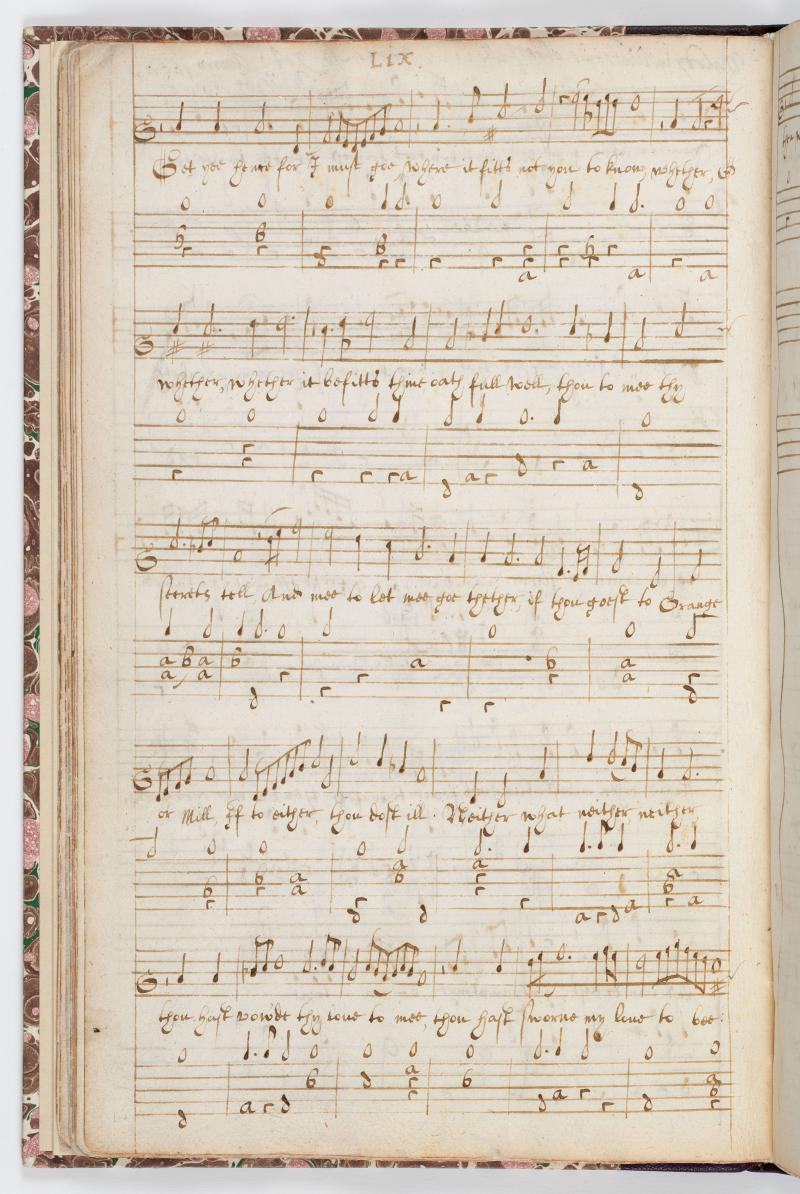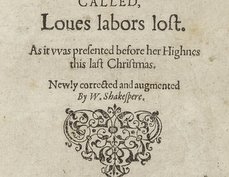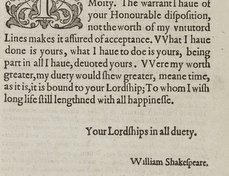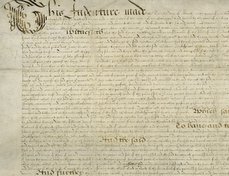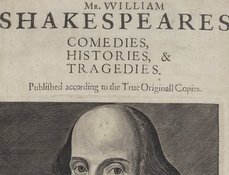Terms of use
The New York Public Library believes that this item has no known US copyright restrictions. The item may be subject to rights of privacy, rights of publicity and other restrictions. Though not required, if you want to credit the Library as the source, please use the following statement, "From The New York Public Library," and provide a link back to the item on their Digital Collections site. Doing so helps the Library track how their collection is used and helps justify freely releasing even more content in the future
Document-specific information
Title: Songs unto the violl and lute
Date: ca. 1620-1630
Repository: The New York Public Library, New York, NY, USA
Call number and opening: MS Drexel 4175 nos. 54 & 59
View online bibliographic record
Laura Estill, "Song one in Macbeth and song five in The Winter's Tale included in a manuscript songbook," Shakespeare Documented, https://doi.org/10.37078/951.
The New York Public Library, MS Drexel 4175 nos. 54 & 59. See Shakespeare Documented, https://doi.org/10.37078/951.
This music book, written around 1620-1630, includes a song from Shakespeare’s The Winter’s Tale (4.4.336), “Get yee hence, for I must goe” (image 2). The manuscript belonged to Ann Twice and was probably copied out for her by her music teacher. Ian Spink suggests that Twice was “probably quite an accomplished singer, able to accompany herself on the lute.” The volume has the inscription “Ann Twice, Her Booke” on the front cover and “Songs vnto the violl: and lute” on the first page.
Although none of the settings in the manuscript are explicitly attributed to the composer Robert Johnson (1588-1633), the tune for “Get yee hence” in Twice’s manuscript was likely composed by him. This attribution rests primarily on the fact that Twice’s songbook includes a number of other songs Johnson is known to have written for early plays and masques (Long 81). Johnson is now best-known for writing the original music to “Where the bee sucks”(5.1.98) and “Full fathom five” (1.2.474) from Shakespeare’s The Tempest.
Scholars such as John Cutts and John H. Long have argued that the tune of “Get yee hence” presented in this manuscript (which also appears in NYPL Drexel MS 4041) represents the original music for performance, while Tiffany Stern suggests that the song pre-dates the play.
Ann Twice’s copy of “Get yee hence” includes a previously unknown second verse to Autolycus’s song, not printed in The Winter’s Tale. While songs often circulated separately from plays, perhaps with additional verses, Cutts suggests that this verse could have been part of the original performance. In the play, the first verse of the song is sung by the ballad-seller Autolycus and two shepherdesses, Dorcas and Mopsa, each adopting a persona for the song. Autolycus takes his leave and Dorcas and Mopsa, in the voice of his loves, ask where he’s going. After the first verse ends, the Clown announces, “We’ll have this song out anon by ourselves” (to paraphrase, “we’ll finish this song later by ourselves”), perhaps not marking the end of the song, but interrupting Autolycus’s singing. When the Clown’s next lines, “my father and gentlemen are in sad talk, and we’ll not trouble them” is considered in relation to the second verse recorded here, about the young lover (sung by Autolycus) lamenting “neuer more for lasses sake / will I dance at fare [fair] or wake,” “sitting sadly” and “walking madly,” concluding with him in some “darke darke Corner weeping,” it is possible the Clown purposely interrupted to avoid the verse’s lovesick and sad tone. Whether earlier audience members would have known this song is difficult to gauge: as Long and Stern demonstrate some songs, such as “It was a Lover and His Lass” from As You Like It, were already familiar to audiences, while others were introduced during the performance (Long 85).
Twice’s songbook also includes a number of other songs from plays and masques, including Ben Jonson’s The Devil is an Ass and John Webster’s The Duchess of Malfi. Although her music teacher was likely the one who copied the songs, Twice, a Gloucester native, was this manuscript’s intended user and audience: she was expected to read not only the lyrics, but also the vocal line, and the accompaniment so that she could sing while accompanying herself on the lute.
The manuscript’s provenance in the late seventeenth and early eighteenth centuries is unknown. Although Twice’s manuscript lists fifty-eight items in the table of contents on the final leaf, only twenty-eight musical settings are now present, including “Get yee hence, for I must goe” (images 2 and 3) from Shakespeare’s The Winter’s Tale (4.4.336) and “Come away, Come away, Hecket [Hecate]” (image 1) from Middleton’s The Witch (which may also have been used in William Davenant’s 1674 Restoration adaptation of Shakespeare’s Macbeth). The earliest text of Macbeth, the 1623 First Folio, simply lists “Come away, come away, &c” as a song by the witches at the end of act three scene five.
Twice’s songbook later belonged to John Stafford Smith (1750-1836), who published selected songs from the manuscript in Musica Antiqua (1812), before it passed to music collector and historian Edward Francis Rimbault (1816-1876). At Rimbault’s death, the New York Public Library bought it for their Drexel collection, where it still resides. A full facsimile of this manuscript appears in Elise Bickford Jorgens, English Song: 1600-1675, volume 10.
Written by Laura Estill
Sources consulted
Cutts, John P. “‘Songs vnto the Violl and Lute’: Drexel MS 4175.” Musica Disciplina 16 (1962): 73-92.
-----. “The Original Music to Middleton’s The Witch.” Shakespeare Quarterly 7.2 (1956): 203-209.
-----. “An Unpublished Contemporary Setting of a Shakespeare Song.” Shakespeare Survey (1956): 86-89.
Eubanks Winkler, Amanda, ed. Music for Macbeth. Middleton, WI: A-R Editions, 2004.
Jorgens, Elise Bickford. English Song: 1600-1675. Vol. 10, “Miscellaneous Manuscripts” New York: Garland, 1987.
Long, John H. Shakespeare’s Use of Music: The Final Comedies. Gainesville: U of Florida P, 1961. Available: https://archive.org/details/shakespearesuseo02long
Smith, John Stafford. Musica Antiqua. 2 vols. London: Preston, 1812. Vol. 1 available: http://imslp.org/wiki/Musica_Antiqua_(Smith%2C_John_Stafford)
Spink, Ian. “Ann Twice, Her Booke.” Musical Times 103 (1962): 316.
Stern, Tiffany. Documents of Performance in Early Modern England. Cambridge: Cambridge UP, 2009.
Taylor, Gary, and Andrew J. Sabol. “Middleton, Music, and Dance.” Thomas Middleton and Early Modern Textual Culture. Oxford: Clarendon P, 2007.
Last updated April 19, 2020


